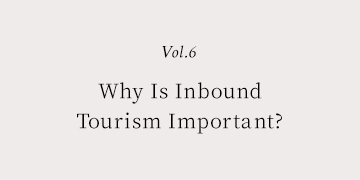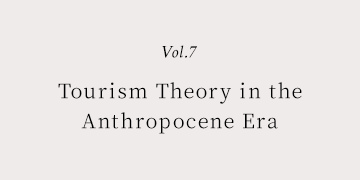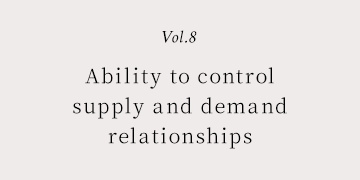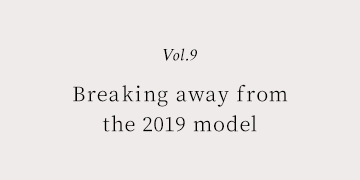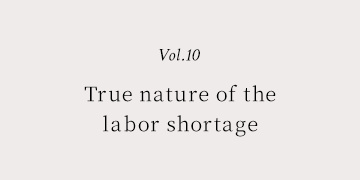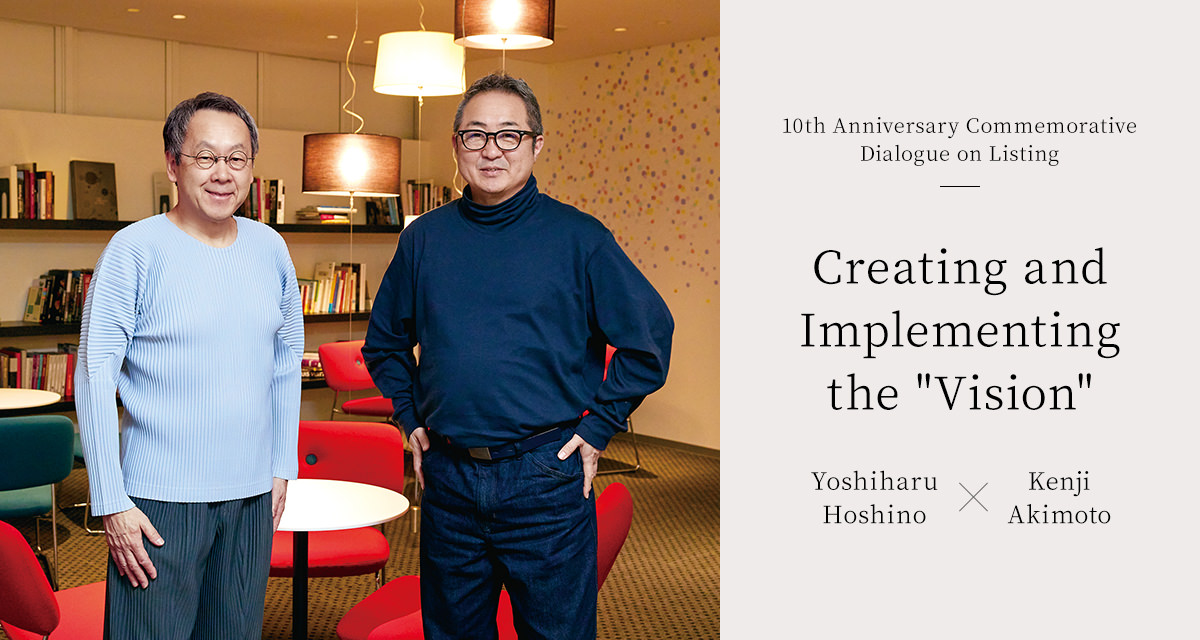
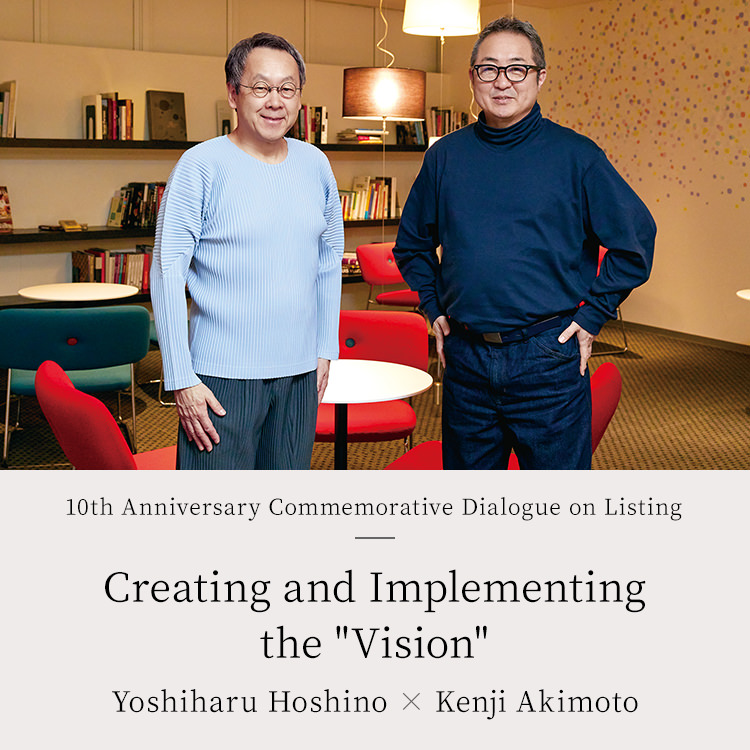
Mr. Kenji Akimoto (hereafter, titles will be abbreviated): Thank you for taking the time out of your busy schedule today. Also, thank you for writing a contribution for our annual asset management report. This July we marked the 10th anniversary of the public listing for Hoshino Resorts REIT, Inc. (HRR). As a commemoration, I have set up a conversation with you, Mr. Hoshino (CEO of Hoshino Resorts).
I would like you to talk about the "Vision" today. If I may go back to 1998, when I joined Hoshino Resorts, a clear vision had been already been established. We were working with enthusiasm towards three specific and straightforward goals to achieve the Vision. From that time, I really felt that Hoshino Resorts was a typical company with a vision-based management style. I believe that has continued right up to the present.
The reason why I would like to talk about a vision now is because I established the Vision for Hoshino Resort Asset Management and have been working on it since then, but over the past one or two years, I have come to feel that it is necessary to review it. One of the reasons for this is that during the occasional small talk meetings that I have with all of my employees, often there are comments like, "I'm not excited about the current Vision," or "I don't know exactly what I want to do." Some people were like saying that the Vision should be changed, and that stuck with me.
HOSHINO: I see.
AKIMOTO: The second reason is that Hoshino Resorts has been in the spotlight due to its strong performance during the COVID-19 pandemic, and the HRR's reputation has increased, and it has passed its target indicator of achieving the Vision for the past six months or so.
So I feel like we're at a phase where we need a new vision. What we have here is the textbook you introduced to me that explains Ken Blanchard's organization theory. In fact, when I read it over again, I realized that it shows a vision at the beginning. I would be very grateful if you could give me some advice before reviewing the Vision and establishing a new one.
HOSHINO: A vision was the first thing I established when I took over Hoshino Onsen Ryokan in 1991. At that time, there were few textbooks on visions, and I learned about visions when I was studying business administration at Cornell University. I was able to learn the importance of visions in Professor Dermody's organization theory class.
Professor Dermody told us that establishing a vision is the most important job for a manager, the one that should be done first. He said there are certain ways to establish a vision, and most importantly, to share that vision. If an employee does not know the vision, the responsibility lies not with the employee but with the management. That left a great impression on me.
You said a while ago that you and your team had passed the numerical targets that you had set. However, according to Professor Dermody's theory, it is not correct to set numerical targets in the body of a vision. The idea was that the vision should be qualitative, that it should be a little more fuzzy. While there is no problem with setting numerical targets as management goals, I believe that numerical values themselves should not become visions.
In 1992, Hoshino Resorts established a vision to "become a master of resort management." Defining "what is a master?" may change with the market environment and therefore the numerical targets should change with it. I think that vision and numerical goals should have this sort of relationship.
Are the numerical targets themselves changed now?
AKIMOTO: To be more specific about that, in fact, for about 3 years after the company went public in 2013, there were so many things to do that it impossible to work on the Vision. When things had calmed down a little, the first thing I did was to establish a mission in a top down manner in 2016. The social mission established for the organization is to attract investment in tourism in Japan. I still do not think that this needs to be changed.
And in order to realize that mission, we set our goal as to become an Excellent Real Estate Investment Trust. This is our Vision. In other words, to become the best real estate investment trust, the No.1 real estate investment trust. There are about 60 listings for J-REIT, so we set the specific numerical targets and indicators that I talked about earlier as the level that should be reached in order to achieve our vision. And we are currently meeting one of those numerical targets.
HOSHINO: Good. I don't think Excellent Real Estate Investment Trust is bad. The challenge is that the definition of "excellent" is unclear, but it can be determined in the next layer. For example, if the business domain is clearly defined as tourism or a hotel, or if the element of excellence can be set not only from the investor's point of view but also from the viewpoint of other stakeholders and the environment, the vector of excellence to be aimed at becomes clear. On the other hand, without it, everyone's idea of excellence can be disorganized.
Another thing that Professor Dermody said was very helpful. You mentioned earlier that you decided the mission in a top down manner. I think that was the right way. Establishing a vision is like "deciding where to go" when a ship leaves port. For example, the captain determines that the ship is bound for San Francisco. If the passengers on the ship were all to start asking "Where shall we go together?" you would end up in a big mess, and if it were decided "Okay, let’s go to Buenos Aires" after the ship leaves port, you would be totally out of control.
Therefore, it was the professor's teaching that the manager must decide the direction of the company by himself, and once he has decided and started running, he should not change it easily even if some people do want to go to Buenos Aires. I think there are a lot of opinions among the people at Hoshino Resorts REIT right now, but you need to be careful when you review or brush up on your vision.
AKIMOTO: In a sense, the wall that I hit in trying to achieve the current Vision was our efforts to make our share price higher than any other company in order to become an excellent real estate investment trust. So, when you start making daily decisions and everything else you do, does this lead to a higher share price? I took it upon myself to query everyone about that, and because I did so, when the share price eventually rose, none of us were excited that it would be good for ourselves. But I do feel that it turned out good for Hoshino Resorts. I wonder what the secret is here.
HOSHINO: I think that it is an issue of defining the word "excellent." In a sense, it is natural to raise profits in corporate management, and we all know that, but if you set your aim on that, you will not motivate your staff. Those of us who work in organizations feel the reward of and pride in our work through the impact our organizations have on society, and that leads to motivation. When profits and share prices become conditions of excellence, it becomes difficult to lead on to motivation.
AKIMOTO: That is quite right. I would ask myself straight away “Is this just a ploy to make the share price go up?" Lately I have come to think that this strategy is not such a good idea.
HOSHINO: By working toward our Vision as something to strive for, we will gain a unique position in the market and lead to sustainable competitiveness in the long term. That may not affect the share price in the short term, but this competitiveness is bound to be linked to earnings, so we should think that it will lead to higher earnings and share prices in the long term.
AKIMOTO: A vision starts when you establish it, does it not? After that, it was very difficult to share and spread the Vision, and Hoshino Resorts made a lot of effort to do so, and as a result, I have the impression that it is working very well. Was there some special tactic behind it?
HOSHINO: I think that maybe there was something to make it seem funny. There is the Buddhist chant "Namu Amida-butsu," for which I think, in the same way, it is important to continue to chant it, to learn it gradually as you chant, even if you don't know the meaning of the actual words. We firstly started by asking people to remember the words, and then created opportunities to understand the meaning and content of the Vision.
AKIMOTO: Every year, you presented each employee with a gift on their birthday, did you not ...
HOSHINO: I was asked to bring this one so I’ve brought it with me today, but it's just a funny cup. It is made so that when you finish your coffee, you see the Vision. It is made in a way that makes it look interesting and so you remember the Vision. By doing so, I am simply trying to uphold Professor Dermody's teaching that it's the responsibility of management to communicate their vision to employees and staff.
The least popular was the alarm clock. When the alarm is set off, my voice would scream out the Vision. We gave out these alarm clocks to all of our employees, and while they all seemed to find them interesting, I do not think that anybody actually used them as intended. I was told that the alarm clocks caused people to feel unwell in the morning.

AKIMOTO: Yes, I still have that alarm clock at home. But I never set the alarm though. That's the type of tactics you used. Ones that bring out a bit of fun.
HOSHINO: Yes, fun things are easy to get into after all. It's fun, so you'll remember it, and of course it is important to repeat it. With human memory, things are stored in long-term memory based on how many times it is repeated over a period of time.
AKIMOTO: So, the only way is for management to keep repeating it?
HOSHINO: Yes, because it is management’s job to make employees remember. It's about creating situations where employees repeatedly see or hear the Vision. When I had the alarm clocks made, I didn't expect employees to really use them every day. It was simply making them see it in an interesting manner, to remember the Vision and with that communicate my earnestness.
AKIMOTO: When I received mine, I thought it was a silly clock and laughed.
HOSHINO: Yes, yes. When somebody says to me something like "You often make these silly things," that's one more chance for them to bring up the Vision. Many people in Hoshino Resorts REIT are serious and logical, so if they know the Vision, they can understand the meaning immediately. That's why I think it's important to just let people remember and keep telling them in an interesting manner. Because it is so important to have employees remember it, it is also important to make the Vision itself easy to remember and simple.
AKIMOTO: I see. I understand well.
Naturally, we all share the current Vision of Hoshino Resorts. I would like to ask you if you have any specific way of achieving the Vision, even though we all share it. I don't think that you have set down the image that you are aiming for in specific terms because as you said earlier "the vision should be fuzzy." For example, if you have a clear image that you are aiming for, like Marriott or Four Seasons or something completely different. I think we can keep pace with that image when we review the Vision and re-set the goal. What do you think about that?
HOSHINO: When I talk about this, it may be lengthy, but I am currently thinking that we need to change the Vision from being a "master of resort management" to being a "Globally Competitive Hotel Management Company," in other words, to become a world-class hotel operator.
I enrolled in the Graduate School of Hotel Administration in America in 1984 and have been watching the changes in the U.S. hotel industry for a long time since then. Although I do see the stunning growth in the industry, I also think that I understand the limitations well. For example, investors and operators tend not to be truly in a partnership and instead focus on short-term revenue-maximizing moves. Organizations are not being truly customer-oriented and they are tending to move away from the needs of travelers. In the short term, it maximizes revenue, but the trade-off is at the expense of customer trust. Because this gap existed, we believe OTAs (Online Travel Agents) have grown rapidly as businesses to fill the gap.
These are businesses such as Expedia and Booking.com which would not have had a chance without this gap that the hotel industry had created itself, and that gap is now a serious factor in hotel revenue that's coming back to haunt us. For example, McDonald's, which has built a strong brand, is a chain that serves hamburgers all over the world, and when you go to a McDonald's store that you've never been to, you don't look at the taste or the restaurant's rating online. Travelers do not even have to check where the price is cheaper.
There is an overwhelming trust between customers and McDonald's. No matter where you go in the world, the taste is the same, the price is reasonable, and all the facilities in the store are recognized by the market as a common understanding. Customers are sure that any store that they go to for the first time will provide the service as expected. This is the status of a strong brand built upon the trust of its customers.
Such a strong brand does not yet exist in the global hotel industry. In terms of the recognition, Marriott and Hyatt may be high, but they don't have enough trust as a brand, so travelers can't decide which hotel to use without looking at third-party reviews. It would not be that way if even the Marriott Group for example had more than 30 brands and 30 distinct market segments. I believe that the reason for this situation is due to the relationship between the investors and the hotel operators.
There are also a lot of operational productivity issues. Few hotel operators have introduced the multitasking we do; few are really looking to increase productivity in the real meaning of the word. Once an organization grows without non-multitasking, although it may know about the benefits of multitasking, it can't go there. This is another gap between ideals and short-term reality. We do not want to leave these gaps unattended, and we want to aim in the direction of being a hotel operator that practices customer-oriented branding and an operator that creates a way to operate with high labor productivity.
AKIMOTO: Certainly, it is completely different from simply aiming to be like Marriott or Four Seasons. In the competitive market, we must establish a unique format that is difficult to imitated, resulting the creation of unique properties for Hoshino Resorts.
HOSHINO: Well, how to create a booking system for travelers, a service for travelers, an organization that can operate for travelers, and create a staff skill set for that; that how it is to be truly customer-oriented. This is an area which the hotel industry still has left unfinished.
In the U.S. hotel industry, third-party operators are booming as investors begin to realize that the way operators operate remains the same and that productivity is comparable. The hotel owner rents only the brand from the hotel company, and contracts a different third party to do the actual operation. In this case, the hotel company's role is to attract customers by brand, but the entities that actually attract customers are OTA channels trusted by consumers.
The various contradictions in the hotel management industry that have grown over the past 50 years are still expanding, and I feel it will reach a critical point at some time. In preparation for that time, we would like to aim for a hotel brand that it should be, the productivity on site that it should achieve, and that is what we have set as our Vision for a "Globally Competitive Hotel Management Company."
AKIMOTO: I understand very well now. By aiming for that, we can expect long-term sustainability. On the other hand, we at Hoshino Resorts REIT should also be interested in the short-term perspective in asset management. What do you think about that?
HOSHINO: The hotel industry's growth over the past 50 years has been driven by a greater division of investment and operational roles. The emergence of hotel operators created a world in which people could own hotels without operating them, and as a result, they were able to direct significant investment capital into the evolution of hotels. The key to the further evolution and growth of the hotel industry of the future is the ability of investors and hotel operators to become truly one team and drive a customer-oriented strategy. It is important to have a balance in which both parties give due consideration to each other's short-term business needs while securing and accurately allocating the resources necessary to enhance competitiveness from a long-term perspective. A hotel operator that investors can rely on should first be able to implement a superior market and brand strategy and second have a mechanism to achieve high operational productivity. These two factors contribute to the long-term sustainability of the entity. I would like to continue to manage Hoshino Resorts with the aim of creating an ideal one-team relationship between investors and hotel operators.
AKIMOTO: Thank you very much. We at Hoshino Resorts REIT would like to set a new vision so that we can keep pace with Hoshino Resorts, enhance our competitiveness and maintain it, further grow and become a truly valued real estate investment trust.
Thank you for taking time out of your busy schedule today.
AKIMOTO: Thank you very much.











